Quick Answer: Yes, cold sores are highly contagious, especially during an outbreak, and kissing can easily spread the herpes simplex virus (HSV-1). Even if the sore is healing or barely visible, HSV-1 can still transmit through saliva or skin contact. If you or your partner has a cold sore, avoid kissing or oral sex until it’s fully healed and the skin is intact.
Cold Sore 101: It’s Herpes. Period.
Let’s start with what most people gloss over: a cold sore is a form of herpes. Specifically, herpes simplex virus type 1 (HSV-1). It’s the same virus that can cause genital herpes, but usually it lives in the mouth, lips, and throat.
Up to 67% of people globally carry HSV-1, often without symptoms. Once infected, the virus stays in your body for life. It can lie dormant for months or years, then flare up when your immune system is stressed, you're sleep-deprived, sunburned, or sick.
That red blister near the lip? That’s a flare. And that’s when the virus is at its most contagious.
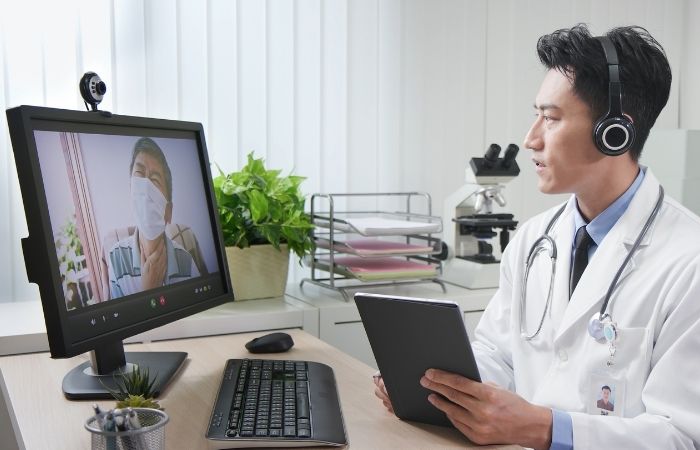
People are also reading: You Didn’t Even Have Sex, So Why Do You Have an STD
How Kissing Spreads Cold Sores
Cold sores don’t need to be obvious to be dangerous. The herpes virus sheds even before a sore appears and during healing. That means if your lips touch someone else’s, skin to skin, or saliva to saliva, you’re risking transmission.
You don’t need to have sex. Kissing alone can transmit HSV-1, and once it’s in someone’s system, it can stay forever. That’s why kissing someone during a flare-up (or right before one) can lead to a lifelong infection.
And yes, HSV-1 can be passed from mouth to genitals during oral sex. If someone with a cold sore goes down on their partner, they can give them genital herpes. It’s that simple.
Is It Still Contagious If It’s Healing?
Short answer: yes. Long answer: It’s most contagious from the tingle stage through the crust stage. That includes the scab you think is “mostly gone.”
The cold sore lifecycle goes like this: tingling → blister → ulcer → scab → healing. At nearly every step, the virus can still be shed. So if you're thinking, "It's not an open sore anymore, we should be good,", not quite. Wait until the skin is fully healed, with no trace of damage.
This isn’t about overreacting. It’s about understanding how viruses behave, and protecting the people you're intimate with.
What About “Just a Little Kiss”?
Let’s be real, there’s no such thing as a “safe” kiss during a cold sore. A peck on the lips can still be enough. Even a kiss near the sore risks contact with viral particles. And don’t forget: viral shedding doesn’t always happen where the sore is. Sometimes the virus is in the saliva, even if the lips look clear.
If you really care about the person, or just respect their boundaries, you’ll wait until the outbreak is over. In the meantime, there are plenty of other ways to connect. Just not lip-to-lip.
Check Your STD Status in Minutes
Test at Home with RemediumGenital & Oral Herpes Test Kit
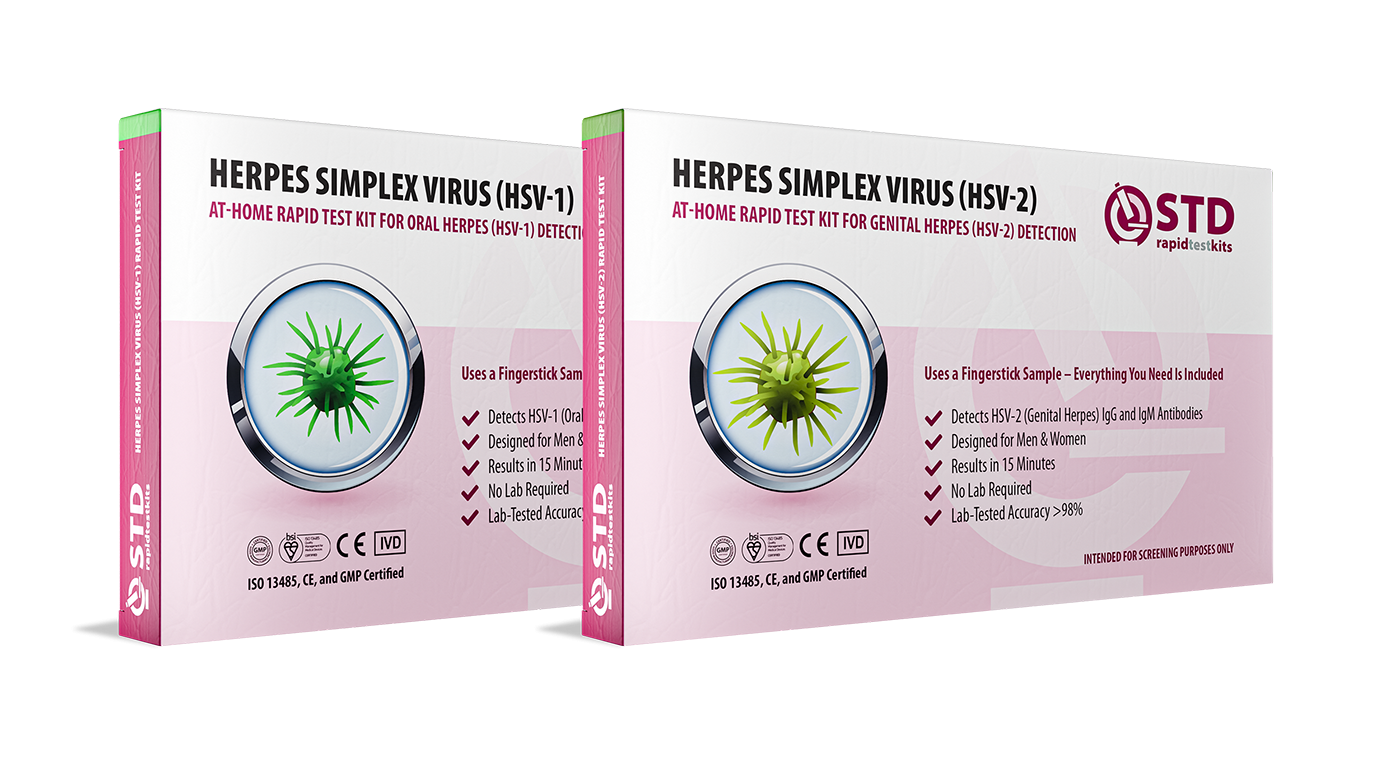
 For Men & Women
For Men & Women Results in Minutes
Results in Minutes No Lab Needed
No Lab Needed Private & Discreet
Private & DiscreetOrder Now $75.00 $98.00
For all 2 tests
How Long Is a Cold Sore Contagious?
A typical cold sore can be contagious for 7 to 10 days, from the first tingle until full healing. That’s a long window for something so small. If you’re wondering when it’s safe to kiss again, here’s the breakdown:
- Days 1–2 (tingle/burn): Highly contagious
- Days 2–5 (blister/ulcer): Most contagious
- Days 5–9 (crusting/scabbing): Still contagious
- Day 10+ (healed skin): Lower risk, but shedding may still happen
Pro tip: Use antiviral treatment as soon as you feel the tingle to shorten the outbreak, and the risk window. Better yet, talk to your provider about daily suppressive antivirals if you get outbreaks often.
What If You Don’t Know You Have It?
Here’s the plot twist: most people with HSV-1 don’t know they have it. You might’ve picked it up as a kid, from a relative’s kiss. You may have had a “pimple” once that was really a mild cold sore. You might be shedding virus without symptoms at all.
That’s why “surprise” herpes infections are so common, and why so many people think their partner “must’ve cheated.” Truth is, the virus can sit quietly for years. No drama. Just virology.
Cold Sore Myths That Put People at Risk
Let’s break down the lies:
- “It’s just a cold sore, not herpes.” Wrong. It is herpes.
- “If there’s no sore, you can’t spread it.” Nope. Asymptomatic shedding is real.
- “If I put a Band-Aid on it, it’s fine.” Not quite. That doesn’t stop viral shedding.
- “Only people who sleep around get herpes.” Absolutely false. You can get HSV-1 as a child.
These myths create stigma, and keep people from being honest. You can’t stop the spread if you don’t understand how it works.
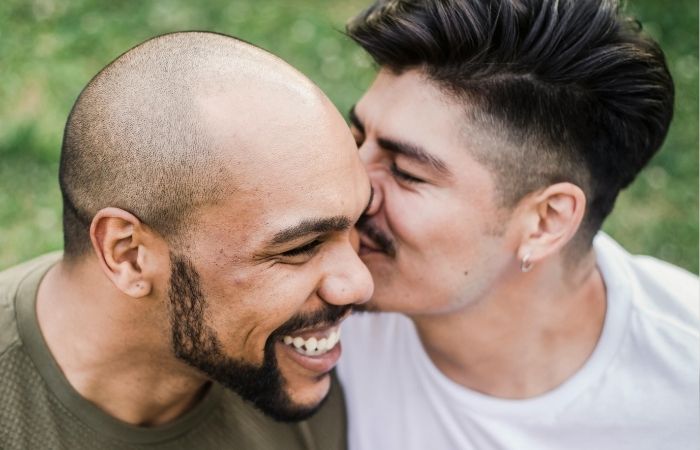
People are also reading: The Oral STD Guide: What Else Can Infect Your Mouth Besides Herpes?
How to Talk to a Partner About a Cold Sore
This is the hard part. But it doesn’t have to kill the mood. If you have a cold sore, or your partner does, here’s how to bring it up:
- “Hey, I’m having a flare-up. Let’s wait until it heals.”
- “I’ve had cold sores since I was a kid. It’s HSV-1. Here’s what that means…”
- “I care about your health, so I want to be upfront.”
People appreciate honesty, especially when it protects them. Having HSV-1 doesn’t make you dirty, unsafe, or unworthy of affection. It just means you’re human. And if they can’t handle that? They don’t deserve your lips.
Cold Sores and Oral Sex: What Most People Don’t Know
Here’s the part no one tells you in health class: HSV-1 from a cold sore can cause genital herpes if you give oral sex during an outbreak. That means if you have a cold sore, even a healing one, and go down on someone, you’re putting them at risk for a lifelong genital infection.
And it works both ways. Receiving oral from someone with an active cold sore puts your genitals in direct contact with the virus. Just one session can be enough to cause a primary outbreak.
Key rule: If there’s a cold sore, skip oral. And don’t assume protection solves everything, dental dams and condoms help, but aren’t foolproof if the sore is outside covered areas.
Can You Kiss Kids or Family with a Cold Sore?
This one’s tricky, and important. HSV-1 is often passed in childhood from well-meaning adults. A kiss on the lips from a parent, grandparent, or older sibling during a flare can lead to lifelong infection for a child.
Infants and people with weakened immune systems are especially vulnerable. In rare cases, herpes infections can lead to serious illness or hospitalization for babies.
During a cold sore outbreak:
- Avoid kissing children, especially on the face or lips
- Don’t share utensils, towels, or drinks
- Wash your hands after applying ointment
Protecting your loved ones doesn’t mean shaming yourself. It means being informed and respectful.
Check Your STD Status in Minutes
Test at Home with RemediumOral Herpes Test Kit

 For Men & Women
For Men & Women Results in Minutes
Results in Minutes No Lab Needed
No Lab Needed Private & Discreet
Private & DiscreetOrder Now $33.99 $49.00
How to Treat a Cold Sore (And Shorten the Outbreak)
Speed matters. Start treatment the moment you feel the tingle. The sooner you act, the less time the sore has to develop, and the less time you’re contagious.
Options include:
- Antiviral pills: Acyclovir, valacyclovir, and famciclovir can stop replication fast
- Antiviral creams: Abreva (OTC) or prescription options reduce severity
- Suppressive therapy: Daily low-dose antivirals for people with frequent outbreaks
Other tips: keep the area clean and dry, avoid picking, and don’t share lip balm or razors. And always wash your hands after touching the sore.
What to Do If You Just Got Exposed
So you kissed someone with a cold sore. Or maybe they told you after. Now what?
- Don’t panic: Not every exposure leads to infection
- Watch for symptoms: Tingling, itching, redness, or pain around your mouth
- Talk to a provider: If you catch it early, antivirals may reduce severity
If you do get infected, it’s not the end of the world. HSV-1 is extremely common and manageable. Your sex life isn’t over. Your love life isn’t over. You just have to learn how to manage it and protect others going forward.
Is There a Way to Know If You’re Shedding Virus?
Unfortunately, no. You can’t feel viral shedding. It happens silently, without symptoms, and can occur even when you’ve had no outbreaks in months. This is what makes HSV-1 so stealthy, and so commonly spread.
Studies show that asymptomatic viral shedding occurs on 10–20% of days in people with oral herpes. That means even if your lips look totally normal, you could still be shedding and unknowingly passing HSV-1 to a partner.
This is why disclosure matters, even when there’s no sore. It also underscores why barrier protection and suppressive antivirals can be game-changers for couples navigating cold sores together.
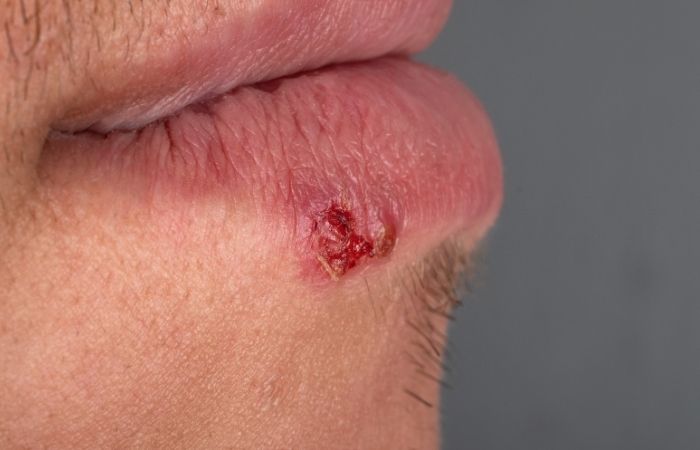
People are also reading: Super Gonorrhea on the Rise: Can Zoliflodacin Replace Ceftriaxone?
Do Lip Balms, Creams, or Home Remedies Really Help?
They can, sort of. Over-the-counter cold sore treatments like Abreva (docosanol) or prescription antivirals like Zovirax can shorten the outbreak by a day or two if used early. But they don’t stop transmission.
As for lip balms and essential oils? Some people swear by lysine, lemon balm, or tea tree oil. There’s limited scientific evidence behind them, but if it feels soothing and doesn’t cause irritation, it’s fine to use. Just don’t expect miracles.
And don’t forget: never dip a contaminated finger into a balm pot, use a clean applicator to prevent re-infection or spreading the virus.
Why This Isn’t Just a “Cosmetic” Problem
Yes, cold sores are small. But the stigma isn’t. Many people feel embarrassed, ashamed, or rejected because of HSV-1. That emotional weight matters. And it’s why education, honesty, and supportive partners are so powerful.
You’re not a walking infection. You’re a whole person. And with knowledge and care, kissing doesn’t have to come with guilt or guesswork.
Check Your STD Status in Minutes
Test at Home with RemediumGenital Herpes Test Kit
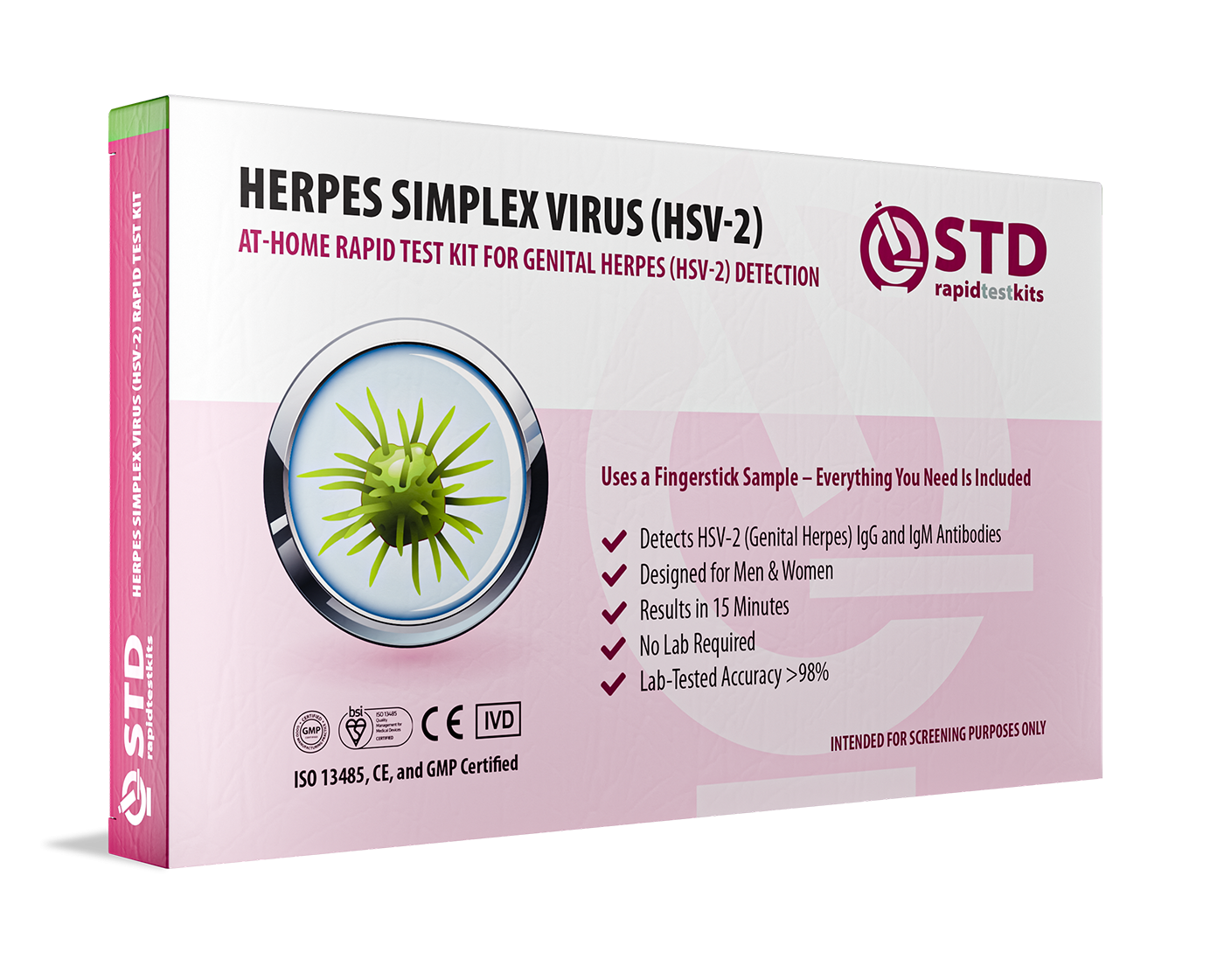
 For Men & Women
For Men & Women Results in Minutes
Results in Minutes No Lab Needed
No Lab Needed Private & Discreet
Private & DiscreetOrder Now $45.99 $49.00
FAQs
1. Are cold sores always herpes?
Yes. Cold sores are caused by the herpes simplex virus, typically HSV-1. They are a form of oral herpes.
2. Can you get herpes from kissing someone with a cold sore?
Absolutely. HSV-1 spreads through skin contact and saliva, especially during an active outbreak.
3. Is it safe to kiss with a scabbed cold sore?
No. Even scabbing cold sores are still contagious. Wait until fully healed with no visible damage.
4. How long does a cold sore stay contagious?
Usually 7–10 days. The virus is most active from the first tingle to full healing.
5. Can I kiss my baby if I have a cold sore?
No. HSV-1 can be dangerous for infants. Avoid contact during outbreaks and practice strict hygiene.
6. Do antivirals stop you from being contagious?
They reduce viral shedding, but don’t eliminate risk completely. Outbreaks become shorter and less frequent.
7. Can I get genital herpes from someone’s cold sore?
Yes. Oral-to-genital contact can transmit HSV-1 to the genitals.
8. If I’ve had HSV-1 since childhood, can I still pass it to partners?
Yes. Even if you rarely get outbreaks, asymptomatic shedding is possible.
9. Can I use condoms or dental dams during oral if I have a cold sore?
Barriers help, but if the sore is outside the covered area, transmission is still possible. Best to wait.
10. Can I still have a normal sex life with HSV-1?
Absolutely. With honesty, protection, and antiviral meds, you can have safe and satisfying sex.
Conclusion
You’re not gross. You’re not reckless. You’re just navigating life, and sex, with a virus that most people have but few understand. Cold sores are common, manageable, and nothing to be ashamed of. But they are contagious, and they deserve care.
If you’ve got one, pause the kissing. Treat it fast. Be honest with your partners. And if you’re on the receiving end? Ask questions. Set boundaries. Protect your own health without shaming anyone else.
Want to know your status? Test from home with STD Rapid Test Kits, private, fast, and judgment-free.
Sources
1. CDC – About Genital Herpes: Including HSV‑1 transmission and asymptomatic shedding
2. WHO – Herpes Simplex Virus Fact Sheet: HSV‑1 spread from oral to genitals and asymptomatic shedding
4. Medical News Today – How long cold sores are contagious and shedding risks










